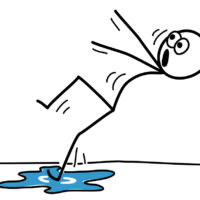Non-Code-Compliant Pool Could Result in Liability for Landlord

A recent case that came before the New York Appellate Division, First Department (including Manhattan and the Bronx), required the court to decide whether a tenant could bring a claim against his landlord for an injury he suffered on the property he occupied. The case is one example of a slip-and-fall claim where liability is based not on a hazard formed through poor maintenance of a property, but from a potential violation of applicable building codes.
Pool deck slip-and-fall
The case, titled Berr v. Grant, stemmed from a slip-and-fall accident occurring at a residential pool. The plaintiff, Michael Berr, was a tenant at a house rented from defendant Ron Grant. On the day of his accident, Berr was hosting a party on the deck surrounding the home’s pool and hot tub. As Berr walked on the narrow brick path that ran between the pool and hot tub, he slipped and tumbled into the hot tub. Berr filed a lawsuit against Grant for his injuries, arguing that the deck was built in such a way that it violated relevant building code sections. Grant filed a motion for summary judgment, arguing that the claim had no legal basis to move forward to trial.
Building code violations as evidence of negligence
Evidence of building code violations can serve as strong support in a trip-and-fall case for the argument that a structure was defective and prone to causing injury. Building codes are created for the express purpose of ensuring that buildings are safe for occupants. It follows that a failure to comply with those codes shows that the owner was negligent in upholding their duty to keep premises safe and in good condition. In this way, the code violations can supply the basis for finding that a property owner has breached their legal duty to visitors or tenants, obligating them to provide money damages to those injured by the dangerous condition.
In the case at hand, the court dismissed the defendant’s motion and permitted the claim to continue. Instead of attempting to prove that the deck was, in fact, compliant with the building code, the defendant’s expert argued that it didn’t matter, since Berr could’ve taken a different path to walk around the pool. While the defendant also presented a document showing that the local village approved of the plan for the pool before it was built, the plan approved of by the village didn’t show a hot tub. Furthermore, the plaintiff’s expert pointed out that the alternative path around the pool was also unsafe and in violation of relevant code sections. Without proof from the defendant that the deck did satisfy building codes to counter this testimony, the court ruled that the claim should proceed toward trial.
If you’ve been injured in a slip-and-fall or trip-and-fall accident in New York, find out if you’re a good candidate to pursue a personal injury claim against the negligent property owner, and contact the effective and seasoned Manhattan premises liability lawyer Leandros A. Vrionedes for a consultation, at 212-889-9362, or in Queens at 718-777-5895.


